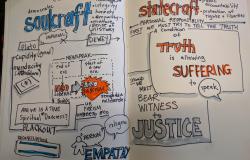Reconciliation Statecraft: Eight competing principal interests

Nayef Al-Rodhan explores the forces that shape states in the current connected and digital global climate.
The international system is now more complex than it has ever been before, with myriad local and global actors operating against a backdrop of unprecedented instant connectivity and deepening interdependence. Yet, it remains remarkably difficult to define what this “complexity” boils down to. Scholarly opinion remains divided, for example, regarding the extent of globalisation and its significance in terms of economic and cultural impact. Debates concerning how influential international organizations are or will become in the future of global governance are equally uncertain.
When a crisis reaches global magnitude, be it related to health (such as the Ebola outbreak), cyber-attacks (e.g. the 2007 nation-wide cyber attack on Estonia), floods or other climatic events resulting from global warming, we are reminded just how varied global challenges are. Moreover, many of our sources of risks – and opportunities – nowadays can go from local to regional to global in a matter of days.
A key factor in the transition to this complex world order has been the advent of the Internet. The rise of the virtual world has irreversibly changed world politics and the global economy, and has empowered citizens around the world, giving them a medium to exchange information and mobilize for political, social or environmental causes. The role of social media during the Arab Spring stands as a perfect illustration. At the same time, the same medium offers new opportunities for governments and helps further political agendas. The US presidential election of 2016 was also influenced in less obvious – yet decisive – ways by the Internet. Experiments have demonstrated with “little doubt” that Google’s search algorithms could shift voting preferences by 20% or more, without citizens knowing they are being manipulated. Just by adjusting its algorithms (which Google does about 600 times a year), Google could theoretically boost the proportion of people who favour a candidate between 37 and 63 percent after one search session.
This is just a brief preview into the complex and – at times, conflicting – forces that shape states in the current connected and digital global climate.
Statecraft in the 21st century
The notion of ‘national interest’ nowadays is not only more encompassing but also more difficult to define. For a time, the global war against terrorism appeared to be the defining issue of our century. With global pandemics, global warming and cyber threats – among other challenges – Western leaders were soon reminded of the fallacy they were committing. Not only do leaders now need to pay attention to many issues simultaneously but they need to do so with an increasingly open view, taking into account sensibilities and expectations that go beyond or at times collide with a narrow interpretation of national interest.
The confined interest of safeguarding national sovereignty and security is the most enduring legacy of the past. Similarities can be identified between 19th century and 21st century statesmen in that they would identify national sovereignty as a fundamental national priority. Beyond this narrowly defined goal of national survival, there are however vast differences between statecraft then and now. One difference, perhaps best articulated by Hannah Arendt in Between Past and Future, is the varying emphasis on security across these settings. The Hobbesian ‘state of nature’ is characterized as a grim and dangerous reality, which can only be escaped through a notion of the political in the form of the Leviathan – all in the name of security. For Arendt, however, to prioritize security in this way is to lose sight of other complex relations human beings are empowered to participate in once political stability has been achieved. In this view, the accomplishment of security is merely the first step towards realizing political life. While statesman of the 19th century undoubtedly shared some aspects of this view, the continued emphasis on national sovereignty and security, sometimes at the expense of all else, limited the achievement of political persons as Arendt conceived of them.
Another crucial difference in statecraft between earlier eras and our own, further explored below, is a widespread, influential, and evolving culture of human rights, beginning in the aftermath of World War II. The international human rights agenda has established norms and parameters for state conduct, further refined by more recent developments in international humanitarian law and the emergence of the concept of human security. The United Nations’ landmark “Responsibility to Protect” provision of 2006, which nuances the notion of state sovereignty to stress both individual states’ and the international community’s collective responsibility to protect populations from mass atrocity crimes, further demonstrates the extent to which human rights have become an increasingly central feature of international relations and which modern statecraft cannot ignore.
While these elements in the evolution of statecraft are particularly noteworthy, they leave a great deal to be sorted out. The question of what defines statecraft in the 21st century is perplexing because, as suggested above, it alludes to many different actors that operate alongside states, as well as many different challenges and issues confronting the international system. In addition, at a more fundamental level statecraft also has to contend with human nature and its various drivers.
My concept of reconciliation statecraft seeks to identify and reconcile the multitude of interests that span public and private actors, individuals, cultures, and global concerns, which must be addressed by statecraft in the 21st century. The concept identifies eight principal interests: individual, group, national, regional, cultural, global, planetary, and moral.
1. Individual well-being is key to domestic stability in the 21st century. It depends on the satisfaction of fundamental needs, a positive self-identity, and a sense of belonging to a broader community in which the individual’s interests are embedded and in whose prosperity the individual is genuinely interested. As citizens around the world are accessing more tools of empowerment and platforms for dissent, states cannot afford to ignore their requests. Ensuring that human dignity is respected will be one of the most important perquisites for states in the 21st century. Soaring disparities between the least well-off and the most fortunate is a critical contributor to the problem. Both domestic institutions and international trade policies that funnel wealth away from those living in, or on the margins of poverty impact the welfare of persons, and ultimately the very stability of states.
2. Group interests are also able to influence policy and cannot be disregarded, especially given the fact that international borders do not always correspond to ethnic, confessional, or tribal distribution patterns. A number of states thus have multi-ethnic identities, while in other cases ethnic communities find themselves separated by state borders. In a world characterised by increasing mobility, diasporas also display a growing capability to influence affairs in both their states of origin, notably through remittances, and in their states of destination. Moreover, the recognition of the rights of indigenous groups is playing an increasingly important role in power relations. Indigenous movements opposing big industry extraction on lands to which the people have historical claims are becoming more prevalent. As Naomi Klein and others have shown, grass-roots movements from Canada and the Western United States to Nigeria have demonstrated the capacity of such groups to confront and—sometimes—alter the agenda of multinational corporations.
3. National interests remain unquestionably foundational to statecraft in the 21st century as states and concerns of security and survival are by no means a thing of the past. The most elementary core of national interest remains the preservation and protection of a state’s territorial integrity and the security of its population. Russia’s annexation of Crimea is one glaring example of how such concerns continue to drive state thinking, and the consequences that result from the violation of the core national interests of one state by another. Further, in light of Britain’s referendum in favour of exiting the EU, and the turn toward a nationalist populism in the US and many other countries, it is clear that policymakers cannot ignore the strong support for national interests. Going forward, it will thus be imperative to both protect threatened national interests, but also to frame national interests in a way that harmonizes with other actors in the international order. Such a course can be navigated according to a paradigm of sustainable national security, premised on the multidimensionality and inter-connectedness of the contemporary security environment and the recognition that mutually advantageous security relationships between states and positive exchanges and interactions between cultures are critical to sustainable long-term security.
4. Regional concerns also remain an important priority. In various forms and at different levels of cooperation, regional bodies and organisations play critical roles for states: from regional security blocs, such as NATO, to forms of economic cooperation such as the BRICS or ASEAN. The European Union provides the most advanced, multi-faceted example of a regional organisation, with its economic, monetary, political, judicial, and security apparatuses. The proliferation of regional bodies and groupings since the end of the Second World War reflects the fact that many modern transnational threats require regional approaches to address them successfully, particularly as many of these threats have regional implications before they have global ones.
5. The management of cultural interests, linked to cultural, linguistic, or religious traditions, is undeniably critical. This has to be based on two elements. The first one is greater respect for individual cultures, which must find the appropriate space for self-expression, with dignity and in full recognition of their rights to manifest their idiosyncrasies. The second element is an aspiration towards greater transcultural understanding. This can be a pivotal contributor to peace in the 21st century, and it remains sadly underdeveloped. National identities often incorporate nation-centric views of their cultures, as well as narratives about their belonging to a specific civilization, i.e. “Western civilization”, “Arab-Islamic civilisation” etc. These divisive views are dangerously inaccurate and superficial, and lack basic knowledge of the more profound roots of civilisations. No culture and civilisation is ever born in isolation and through an intrinsic “merit” of its own, and no hierarchies of civilisations can be rightly established. The concept that best describes the birth, evolution, symbiosis and exchanges between cultures is “the ocean model of civilisation”, which looks at the deeper historical (and often forgotten) links between cultural domains. Going beyond divisions perpetuated by historical curricula, and exploited by divisive politicians, it becomes increasingly clear that the extent of exchanges between the Arab-Islamic world and Europe, for example, in various fields of sciences, medicine, philosophy, arts, astronomy, was enormous and profoundly impacted the advancement and progress of Europe at the time, just like the Arab-Islamic world had too benefited from, and built upon, exchanges with other cultural domains before its “golden age”, including Greece, India and China. Uncovering these lost fragments of our shared histories can go a long way in building more trust and understanding between cultures, and contribute to more appreciation for this long history of fruitful cooperation.
6. Global interests, shared by a number of or all states in the international system, play an important role in statecraft. Even matters of hard security, such as nuclear arms races, traditionally pursued in the framework of competition and deterrence, find resistance not only from other states, but non-governmental movements, organisations and initiatives. This is particularly true in the context of a more interconnected world, where a reputation for willingness to cooperate is a valuable asset, and which is less likely to be dominated by hegemons as power becomes increasingly diffuse. While many counter-examples can be provided about policy goals pursued in isolation of global security, states are increasingly demonstrating that zero-sum calculations are almost virtually impossible and counter-productive in the 21st century.
7. Further on, planetary interests will be among the most pressing concerns in the coming decades. As the series of UN-sponsored climate change conferences, such as COP 21 held in Paris, has shown, issues of common importance now bring all countries to the negotiating table, with little choice but to devise policies that advance shared prosperity that cannot be achieved at the expense of environmental damage. Indeed, while none of the previously listed interests that statecraft needs to reconcile in the 21st century can be ignored, a planet and biosphere suitable for human habitation is a precondition for all of them. This implies that international collaboration on an unprecedented scale will prove to be a necessary element of statecraft in the foreseeable future.
8. Finally, moral interests are pivotal to statecraft in our century. Increasingly, the exercise of not only smart, but just power will be needed in international relations. The opinions and expectations from civil society organisations to common individuals cannot be dismissed and leaders around the world will face mounting pressure to respond to demands for inclusiveness, justice and dignity. Further, as Kathryn Sikkink argues in The Justice Cascade, mechanisms for bringing war criminals and human rights violators to justice are increasing in their number, reach, and efficiency. Even with regard to states that are reluctant to acknowledge the jurisdiction of the International Criminal Court (ICC), there is increasing intolerance in the international community for perpetrators not being held to account. States will need to conform to more inclusive notions of justice, and respect for human dignity. In spite of moral norms playing a lesser role in setting stringent parameters for statecraft in previous eras, states will find it very difficult to cast moral considerations aside.
Looking ahead: from pragmatic “national interest” to reconciliation statecraft
National interests serve as a foundation and “guiding direction for the formulation of policy”. The Realist school of thought, and thinkers such a Hans Morgenthau, have postulated time and again that there is a set of fixed and permanent national interests that are largely unencumbered by circumstances. This has come to be interpreted as implying, quite inaccurately, that state interests remain static. However, there are important fluctuations over time as to what the meaning of national interests entails. The Realists would hardly refute this point, given their well-known pragmatism and core philosophy of survival, which requires states to be able to adjust and use resources in the best possible way to maintain their status in the international system. Two main issues can be identified with this. The first is that the Realist paradigm must be questioned more seriously in its fundamental tenets. The Realist assumptions of perpetual competition in international affairs, animosity, self-interestedness is based on analogies with human nature, as it was conceptualized in the writings of thinkers such as Thucydides, Machiavelli and Hobbes. What followed from these was that if men were selfish and power-driven, so were states. Not only is this view reductionist, it is also incomplete and lacking scientific basis. Neuroscience has revealed a much more complex picture of human nature and some of these findings reveal some surprising facts about the nature of human behaviour. Three core traits seem to define humanity – as per the knowledge and evidence that neuroscience provides thus far – and these are emotionality (humans are far more emotional than previously believed, and emotions play a huge part even in the brain processes associated with rational thinking), amorality (we are neither innately moral nor immoral, but amoral: our moral compass is shaped and solidified in the course of our existence) and egoism (defined as the pursuit of those actions that maximize our chances of survival, which is a basic form of egoism). The Realist analogy needs an update in light of these findings. The problem was not with the analogy man-state, but rather with the fallacy of the definition of human nature, which was largely speculative. Therefore, IR theory needs to engage with the notion of the emotional amoral egoism of states, and regard state behaviour in its complexity.
The second, related, omission of Realism is the fact that – in its fixation on rational behaviour – it failed to acknowledge the importance and pervasiveness of emotionality in state behaviour and of strategic culture, which is a unique expression of a country’s distinct history (real and imagined), and experience in world politics. There are several sources to strategic culture: attachments to cultural norms and heritage, history, religion, and narratives about that country’s history and role in the world. Some examples include China’s obsession with the “century of humiliation”, Israel’s persistent insecurity and deep emotional view of its past, or the US pride in its exceptionalism and role as beacon of democracy. This does not mean that national pragmatic interest is irrelevant, but that there are additional subjective factors that skew a country’s ‘cold’ and rational choices of foreign policy and strategy.
We can therefore agree on a generic definition of national interest as pivotal to states and the international system, yet the specific content of that interest can fluctuate. For instance, during the Clinton administration, all seven national security strategies identified three core interests that are timeless for the United States: common defence, general welfare, and liberty and democracy. All of these objectives were translated into specific action points from one US national strategy to another.
The notion of reconciliation statecraft should not, therefore, be mistaken for total abandonment of past doctrines but rather be seen in a continuum, as a means of adapting to the changing environment of the 21st century. By acknowledging the various interests outlined above in a more thoroughgoing and careful way, practitioners of statecraft can ensure that contemporary considerations crucial to their craft are not being ignored and that their pragmatic national interest concerns are more likely to be realised.
[Prof. Nayef Al-Rodhan (http://www.sustainablehistory.com/ & https://oxford.academia.edu/NayefAlRodhan), is an Honorary Fellow at St Antony’s College, University of Oxford, and Senior Fellow and Head of the Geopolitics and Global Futures Programme at the Geneva Centre for Security Policy. Author of: Neo-statecraft and Meta-geopolitics: Reconciliation of Power, Interests and Justice in the 21st century (Zurich&Berlin: LIT, 2009). Tweet @SustainHistory
Credit image: Giulia Forsythe via Flickr (CC BY 2.0)


